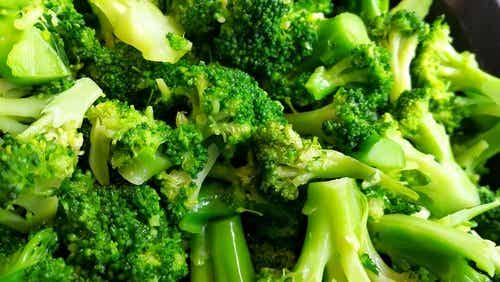The Importance of Folic Acid During Pregnancy

When a pregnant woman goes to her doctor for a check-up, one of the first recommendations is to take folic acid during pregnancy. The consumption of this supplement in pregnant women is common, so it’s important to know what contribution it makes to the body.
We’ll explain why this nutrient is especially important in pregnancy and what consequences a deficiency in folic acid levels would have on the health of the mother and child.
What is folic acid?
Also called folate or folacin, folic acid is a water-soluble vitamin (vitamin B9) belonging to the B group. Its presence in spinach leaves was discovered in the 1940s; its name derives from the Latin for leaf, ‘folia’.
After folacin synthesis, the so-called folic acid is obtained, which is very popular among pregnant women. Folic acid plays an important role in the synthesis of nucleic acids or DNA; it helps cells to duplicate successfully.
The consumption of this vitamin, although more common in pregnant women, is also prescribed to other types of patients.
Benefits of consuming folic acid in pregnancy
1. Prevents premature delivery
The intake of folic acid at least twelve months prior to conception reduces the probability of having a premature birth by up to 50 percent.
Likewise, this vitamin is ideal to prevent malformations in the baby’s spine and head during pregnancy, according to research published in the journal Reproductive Toxicology. The neural tube is the structure in charge of giving rise to the spinal column; its formation period ends on the 28th day after gestation.

Folic acid prevents defects in the closure of the neural tube, thus helping to avoid diseases in the fetus such as:
- Spina bifida: this ailment is a product of the incomplete closure of the neural tube at the end of the embryo’s first month of life. It’s not a hereditary condition and there are two variations: Spina Bifida Occulta or Cystic or Open Spina Bifida.
- Encephalocele: a congenital disease in which one of the diverticula of the brain tissue and meninx protrude. Clear defects are formed in the cranial vault.
- Anencephaly: this is the lack of brain mass.
Other benefits of ingesting folic acid in pregnancy include that it contributes to the strengthening of heart health. In addition, it promotes cell division, essential for the formation of tissues and organs of the fetus.
“In the synthesis of nucleic acids or DNA, folic acid plays an important role; it contributes to the successful duplication of cells”.
Recommended folic acid dosage in pregnancy
When a woman plans to become pregnant, it’s important that she starts taking folic acid three months before conception. In this pre-pregnancy period, the recommended dose is 400 micrograms per day. However, it may vary according to each woman’s body.
In the first three months of gestation, the dose increases: it rises to a range between 600 and 800 micrograms daily. In these cases, the doses will also be indicated depending on the requirements of each woman.
It’s quite common for the specialist to prescribe a multivitamin supplement containing up to one mg of this substance to pregnant women, according to a study published in the Journal of Clinical Pharmacology. This way, the aforementioned pathologies are prevented.
If the mother has a family history of babies born with neural tube defects, the dose will probably be increased to 4,000 micrograms per day.
Foods rich in folic acid
Beyond pharmacological supplementation, women should have a diet rich in folic acid during pregnancy. There are foods of animal and vegetable origin that contain vitamin B9, but the amounts in them aren’t sufficient. Therefore, the daily requirements must be met with supplements.
Plant origin
- Green leafy vegetables: romaine lettuce, turnip greens, spinach, brussels sprouts, kale, and collard greens.
- Fruits: grapefruit, grapes, oranges, Chinese melon, papaya, and strawberries.
- Vegetables: asparagus, broccoli, okra, cauliflower, beets, celery, carrots, pumpkin, lima beans, and avocado.
- Seeds and nuts: flaxseed, sunflower, walnuts, almonds, and peanuts.
- Grains: peas, lentils, chickpeas, beans, black, white, and pinto beans.

Animal origin
- Veal liver
- Chicken offal
- Turkey liver
- Seafood
- Fish
Other foods that have been artificially enriched also provide a good dose of folic acid. Some of these are whole grains, wheat flour, and products made from them such as bread, for example.
It’s essential for pregnant women to consume folic acid
In addition to the important benefits of consuming folic acid during pregnancy for the fetus, it provides many other benefits to women after pregnancy. For example, it strengthens the hair structure and prevents hair loss and also prevents dryness, adds shine, and delays the appearance of gray hair.
Ultimately, folic acid helps prevent anemia and contributes to the absorption of nutrients such as proteins and carbohydrates. As you can see, it’s an essential nutrient in this phase.
When a pregnant woman goes to her doctor for a check-up, one of the first recommendations is to take folic acid during pregnancy. The consumption of this supplement in pregnant women is common, so it’s important to know what contribution it makes to the body.
We’ll explain why this nutrient is especially important in pregnancy and what consequences a deficiency in folic acid levels would have on the health of the mother and child.
What is folic acid?
Also called folate or folacin, folic acid is a water-soluble vitamin (vitamin B9) belonging to the B group. Its presence in spinach leaves was discovered in the 1940s; its name derives from the Latin for leaf, ‘folia’.
After folacin synthesis, the so-called folic acid is obtained, which is very popular among pregnant women. Folic acid plays an important role in the synthesis of nucleic acids or DNA; it helps cells to duplicate successfully.
The consumption of this vitamin, although more common in pregnant women, is also prescribed to other types of patients.
Benefits of consuming folic acid in pregnancy
1. Prevents premature delivery
The intake of folic acid at least twelve months prior to conception reduces the probability of having a premature birth by up to 50 percent.
Likewise, this vitamin is ideal to prevent malformations in the baby’s spine and head during pregnancy, according to research published in the journal Reproductive Toxicology. The neural tube is the structure in charge of giving rise to the spinal column; its formation period ends on the 28th day after gestation.

Folic acid prevents defects in the closure of the neural tube, thus helping to avoid diseases in the fetus such as:
- Spina bifida: this ailment is a product of the incomplete closure of the neural tube at the end of the embryo’s first month of life. It’s not a hereditary condition and there are two variations: Spina Bifida Occulta or Cystic or Open Spina Bifida.
- Encephalocele: a congenital disease in which one of the diverticula of the brain tissue and meninx protrude. Clear defects are formed in the cranial vault.
- Anencephaly: this is the lack of brain mass.
Other benefits of ingesting folic acid in pregnancy include that it contributes to the strengthening of heart health. In addition, it promotes cell division, essential for the formation of tissues and organs of the fetus.
“In the synthesis of nucleic acids or DNA, folic acid plays an important role; it contributes to the successful duplication of cells”.
Recommended folic acid dosage in pregnancy
When a woman plans to become pregnant, it’s important that she starts taking folic acid three months before conception. In this pre-pregnancy period, the recommended dose is 400 micrograms per day. However, it may vary according to each woman’s body.
In the first three months of gestation, the dose increases: it rises to a range between 600 and 800 micrograms daily. In these cases, the doses will also be indicated depending on the requirements of each woman.
It’s quite common for the specialist to prescribe a multivitamin supplement containing up to one mg of this substance to pregnant women, according to a study published in the Journal of Clinical Pharmacology. This way, the aforementioned pathologies are prevented.
If the mother has a family history of babies born with neural tube defects, the dose will probably be increased to 4,000 micrograms per day.
Foods rich in folic acid
Beyond pharmacological supplementation, women should have a diet rich in folic acid during pregnancy. There are foods of animal and vegetable origin that contain vitamin B9, but the amounts in them aren’t sufficient. Therefore, the daily requirements must be met with supplements.
Plant origin
- Green leafy vegetables: romaine lettuce, turnip greens, spinach, brussels sprouts, kale, and collard greens.
- Fruits: grapefruit, grapes, oranges, Chinese melon, papaya, and strawberries.
- Vegetables: asparagus, broccoli, okra, cauliflower, beets, celery, carrots, pumpkin, lima beans, and avocado.
- Seeds and nuts: flaxseed, sunflower, walnuts, almonds, and peanuts.
- Grains: peas, lentils, chickpeas, beans, black, white, and pinto beans.

Animal origin
- Veal liver
- Chicken offal
- Turkey liver
- Seafood
- Fish
Other foods that have been artificially enriched also provide a good dose of folic acid. Some of these are whole grains, wheat flour, and products made from them such as bread, for example.
It’s essential for pregnant women to consume folic acid
In addition to the important benefits of consuming folic acid during pregnancy for the fetus, it provides many other benefits to women after pregnancy. For example, it strengthens the hair structure and prevents hair loss and also prevents dryness, adds shine, and delays the appearance of gray hair.
Ultimately, folic acid helps prevent anemia and contributes to the absorption of nutrients such as proteins and carbohydrates. As you can see, it’s an essential nutrient in this phase.
All cited sources were thoroughly reviewed by our team to ensure their quality, reliability, currency, and validity. The bibliography of this article was considered reliable and of academic or scientific accuracy.
- Gool JD., Hirche H., Lax H., Schaepdrijver L., Folic acid and primary prevention of neural tube defects: a review. Reprod Toxicol, 2018. 80: 73-84.
- Chitayat D., Matsui D., Amitai Y., Kennedy D., et al., Folic acid supplementation for pregnant women and those planning pregnancy: 2015 update. J Clin Pharmacol, 2016. 56 (2): 170-5.
This text is provided for informational purposes only and does not replace consultation with a professional. If in doubt, consult your specialist.








